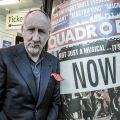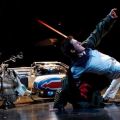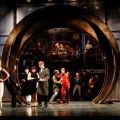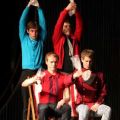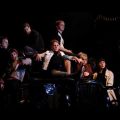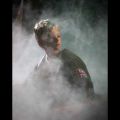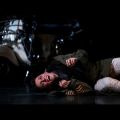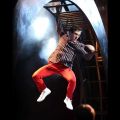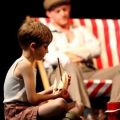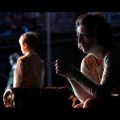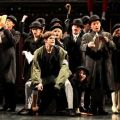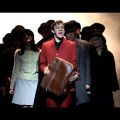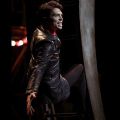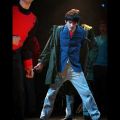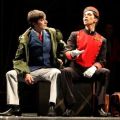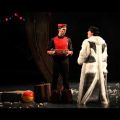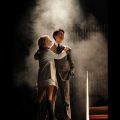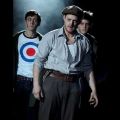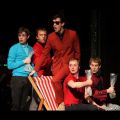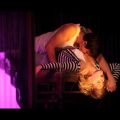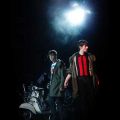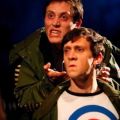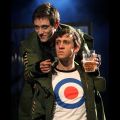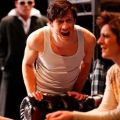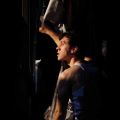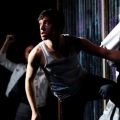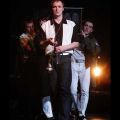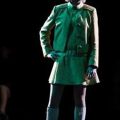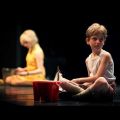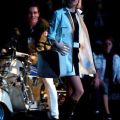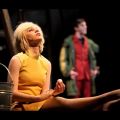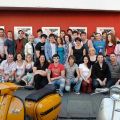Quadrophenia musicals
The first theatrical stage production of Quadrophenia was presented by Luna C Productions in Los Angeles in November 2005. Additional performances were produced in March and November 2006. In February 2007, a new production was staged at the Royal Welsh College of Music & Drama Sherman Theatre in Cardiff, Wales, which was officially sanctioned by Pete Townshend in association with Industrial Language Ltd, and exclusive arrangement with Eel Pie Publishing. This production was directed by Tom Critchley and written by Jeff Young, with musical direction and orchestration by John O'Hara. A couple years later this production was reworked, recast and expanded into a successful full-scale UK tour which launched at the Theatre Royal, Plymouth in May 2009, and toured across the country for 6 months before closing at Coventry in October 2009.
Here are the details of this ground breaking musical stage production of Quadrophenia, followed by exclusive new interviews with Musical Director Elliott Ware and Musical Playwright Jeff Young that were conducted in June, 2014.

"I am excited about this new production. Its genesis in workshop in Cardiff was wonderful, and what is happening now with the Theatre Royal Plymouth feels right-sized on the one hand, but also insanely ambitious for such a tricky piece. It's taken a long time, and a lot of wrangling to accept that Quadrophenia is probably never going to work as conventional music theatre. So I hope for a grand and chaotic explosion of music and chorus that revives the memories of being young in the '60s, but also brings those memories to life in the 21st century." Pete Townshend - 2009
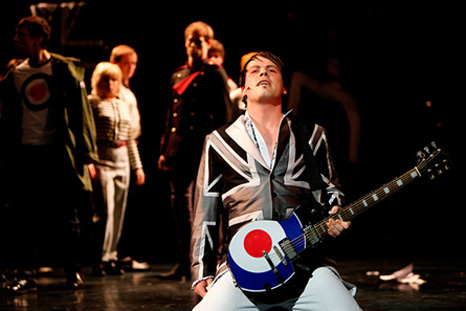
Production Credits
Music, Lyrics and concept by Pete Townshend
Stage Adaptation by Jeff Young, John O'Hara and Tom Critchley
Produced by Bill Schultz, Ina Meibach, and Theatre Royal Plymouth
Director Tom Critchley
Written by Jeff Young
Musical Supervisor & Arrangements John O'Hara
Set Design Sophie Khan
Costume Design Carl Perry
Choreography Frances Newman
Lighting Design Ace McCarron
Fight Direction Kevin McCurdy
Sound Design Jason Barnes
Musical Director Elliott Ware
Casting Director Pippa Ailion
Cast
Ryan O’Donnell (Jimmy – Romantic)
Jack Roth (Jimmy – Lunatic)
George Maguire (Jimmy – Tough Guy)
Rob Kendrick (Jimmy – Hypocrite)
Sydney Rae White (The Girl)
Kirsty Malone (Mum)
Dawn Sievewright (Guardian Angel)
Iris Roberts (Guardian Angel)
Lillie Flynn (Guardian Angel)
John Schumacher (Dad)
Kevin Wathen (The Godfather)
Ryan Gage (Ace Face)
Tom Robertson (Gang Leader)
Daniel Curtis (Swing)
Sean Croke (Swing)
Brennan Reece (Swing)
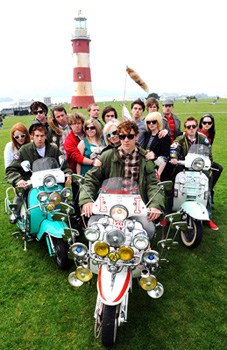
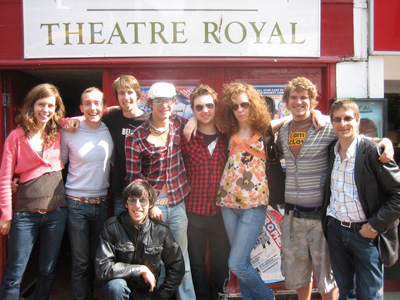
Musicians
MD/Keyboards 1 - Elliott Ware
Keyboards 2 - Tim Whiting
Guitar 1 - Nick Kendall
Guitar 2 - James Canty
Bass - Steffan Iestyn Jones
Drums - Greg Pringle
Brass - Owain Harries
Cello - Anna Menzies
Violin - Miriam Davis
2009 Tour Dates
Plymouth Theatre Royal, May 9-16
Birmingham Hippodrome, May 18-23
Edinburgh Festival Theatre, May 25-30
Glasgow Kings Theatre, June 1-6
Bath Theatre Royal, June 8-13
Manchester Opera House, June 15-20
Sunderland Empire, July 6-11
Cambridge Arts Theatre, July 20-25
Cheltenham Everyman, July 27-Aug. 1
Leeds Grand, Aug. 3-8
Nottingham Concert Hall, Aug. 10-15
Aberdeen His Majesty's, Aug. 17-22
Liverpool Empire, Aug. 24-29
Brighton Theatre Royal, Aug. 31-Sept. 5
Wolverhampton Grand, Sept. 21-26
Coventry Belgrade, Sept. 28-Oct. 3
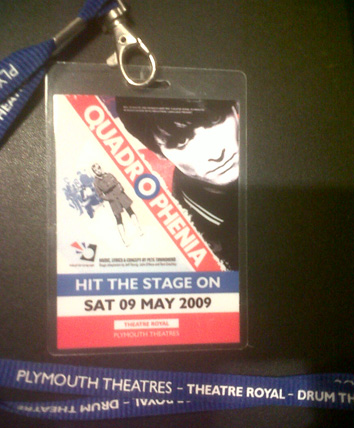
Press
Interview with Pete Townshend on BBC Spotlight
Interview with Tom Critchley on Broadway World
Video news clip and interview with Pete at Theatre Royal in Bath
Video of mods scooter rideup in Cambridge
Video of mods scooter rideup in Manchester
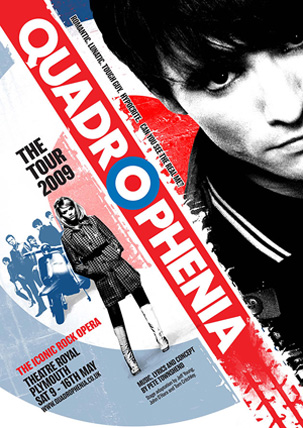
Interview with Musical Director Elliott Ware on Future Radio Norfolk from 2009.
Interview with Elliott Ware - June 2014
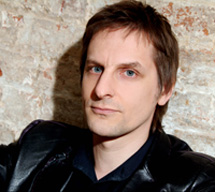 Elliott Ware worked as Musical Director for Pete Townshend's Quadrophenia (stage production) in 2009, and as co-Musical Director, Keyboard Player and String Arranger for The Who’s performance of Quadrophenia at The Royal Albert Hall in 2010.
Elliott Ware worked as Musical Director for Pete Townshend's Quadrophenia (stage production) in 2009, and as co-Musical Director, Keyboard Player and String Arranger for The Who’s performance of Quadrophenia at The Royal Albert Hall in 2010.
Elliott has also performed with other legendary artists such as Alice Cooper, and Brian May and Roger Taylor of Queen. He is currently working alongside Ray Davies as Music Supervisor/Music Director/Arranger and Orchestrator for the world premier of Sunny Afternoon about the formative years of The Kinks. Other work as Musical Supervisor and/or Musical Director includes Rock of Ages (West End/UK Tour), Queen's We Will Rock You (London/Canada), Footloose (Playhouse), and Rocky Horror Show (UK tour). He has played keyboards for Wicked, Spamalot, Zorro, The Sound of Music (all West End), and Flashdance (UK tour).
When did you first meet Pete Townshend, and how did you become involved with the stage production of Quadrophenia?
I'd been music director at a show called We Will Rock You for about three years, which was set up by the rock group Queen. The bass player for that show was Neil Murray who played with Black Sabbath and Whitesnake. One of his deps/subs [stand-ins] was Jonathan Noyce. Jon had played with Jethro Tull for about ten years and as it happened Tull was one of my favourite bands. It was via Jon that I got an interview for the Quadrophenia stage production. I'd been unemployed and was Googling around to see what might be out there, and on a forum I saw one of the discussion threads mentioned Quadrophenia. I saw that there was an intention to bring it to the stage and I looked up the names of the creative team....the director Tom Critchley, the book writer Jeff Young and the music supervisor/arranger John O'Hara. I looked them up and saw that John O'Hara was in fact the keyboard player of Jethro Tull at that time, so I contacted Jon Noyce and he passed me John's e-mail address. It's always who you know isn't it? I guess you have to be able to do the job, but I've only ever got work through people I know or have met...
The first time I met Pete was in one of the cast auditions. We'd been doing them for a few days in Brixton, and in walked Pete one day. A towering figure physically, in demeanor and artistically. That's when the heart takes a jump, the first time you see someone you admire and for whom you are essentially working. I relish it though. I'm not easily intimidated or over awed, but I am full of respect and admiration.
How much input did Pete have for the musical direction and casting of the production? Did he give any specific brief or suggestions?
Pete had handed over the creative control of the stage production, so he oversaw it as opposed to contributing artistically. Of course you'd be foolish to not welcome his thoughts and input in the process, so if he made suggestions you'd want to listen. He had preferences with regards to who we picked for the production, so if he was keen on someone we went with his choice. Musically he sat in for many of the rehearsals and would make comments and suggestions. But he didn't try and control events or direction.
What was your process for adapting the music from the studio album and bringing it to the stage?
The musical arrangements for the production weren't mine. They were John O'Hara's. But I did influence what was played and how it was played. I listened to the album many times and would identify bits I thought necessary or stylistically important and would ensure they were there and played with the right intention. During the run I would constantly evolve and tweak the music.
What qualities were important for the actors and musicians to have in order to bring the music of Quadrophenia to life?
The creative team wanted actors and not typical music theatre people. There are pros and cons to that. The pros are that actors are usually more 'real', the cons are that they may not be able to sing!! Ha! But that's my job as a music director...to realise the music...and if I need to spend time with someone to get them to sing in the right way, then that's what I'll do. The cast were brilliant. The experience was thrilling. They were all characters, with bags of personality. Not polished in a shiny artificial over schooled way, but were earthy, visceral and very talented. Many of us have remained friends and incidentally I am now working on a production about The Kinks with two of the cast members from Quadrophenia. George Maguire who plays Dave Davies suggested me as MD and I in turn put forward Lillie Flynn who plays Rasa, Ray Davies' first wife.
How was the stage band integrated into the action that took place on the stage? Were they part of the story, or more in the background?
The band were in view, there were nine of us. Two guitars, two keyboards, drums, bass, brass player, violin and cello. We weren't part of the action too much. We played on a two tiered scaffold and the actors would join us up there at times. We were fully on view and that adds to the drama in itself.
Was there any additional music or sound effects used, other than what was played by the band?
We added some other Who songs to help the narrative but also so some of the hits were present. We played them all live. Can't Explain, Substitute, Anyway Anyhow Anywhere, Heatwave, So Sad About Us, Zoot Suit (I think....can't remember) and My Generation as the encore. As far as the Quadrophenia music is concerned we used sound effects for the sea, thunder, kettle boiling and cat noise (or whatever that is in I Am The Sea)!
Did you have any favorite songs that you felt worked particularly well as a musical number? Were there any that didn’t work as well?
On a general note what I love about Pete's writing is the rollercoaster of emotion and colour he uses in his music. As well as the unadulterated hard edged stuff, he can write so tenderly. It has sentiment but is never sentimental. And he doesn't dwell either. So you are propelled forward. As far as Quadrophenia is concerned it is all my favourite. I just love it. Not sure I can pick which songs I like best as it is definitely a piece of music... a composition. I adore Cut My Hair and of course Love Reign O'er Me and the two instrumentals that bookend the album are monumental....majestic. A particular thrill to play at each performance was the last twenty minutes or so. Sea and Sand, Drowned, Bell Boy, Dr Jimmy, The Rock and finally to cap it all Love Reign O'er Me. It is unremitting in its scale and drama, building bit by bit....until there is nowhere left to go. Glorious...joyous...life enhancing.
Did you perform with the stage band during performances, or were you strictly working behind the scenes on that project?
The audition process will have lasted about three or four weeks and the rehearsals were probably five weeks.....I can't quite remember. I did play keyboards/piano and conduct every night once the tour was up and running. I had an assistant musical director who played keyboards as well. Occasionally he would get a stand in or dep to play his keyboard chair and he would play my chair. That's so I could watch the performance from out front to take notes and make sure everything was still sounding good.
You also worked as the Musical Director and played keyboards for The Who when they performed Quadrophenia at the TCT Royal Albert Hall concert in 2010. How did working with The Who on that show compare to your work on the musical? Did you leverage the work you did for the stage production, or draw on The Who’s 1996/97 Quadrophenia production?
In the stage production I played most of the piano stuff. In the concert I did of Quadrophenia Rabbit played the piano stuff, so I played everything else! Although we had a full brass section I was keen to double some of that because some of the sounds on the album are synth oriented and I wanted that colour to be there too. The concert with The Who was essentially a copy of the '96/'97 tour, not musically necessarily but as a production. I didn't copy what Jon Carin did. I knew that music inside out of course from doing the stage production but I spent weeks relearning the album top to toe, programming my keyboard sounds meticulously, writing string arrangements as Pete wanted a couple of string players and learning everything I thought appropriate. I even played certain guitar licks if they weren't covered by Pete or Simon. Eddie Vedder guested for that performance and complimented me on what I was doing, so that was nice to hear. I had invested a load of time for that performance and it will always be a treasured memory. I'd say that was the most complete version they have done of Quadrophenia and it's a shame, not least for me, that we only ever did it once. Nothing was clicked or on track and had we done more performances it could have been truly astonishing and unsurpassed.
You are currently working with Ray Davies as the MD for ‘Sunny Afternoon’, the brand new musical about the early days of the Kinks. What is it like working with such legendary talents as Ray and Pete, and how would you compare their working style and involvement with staging productions of their classic works?
It's a thrill of course. They are of a type, but individuals. There's an unusualness about them which I really warm to! They are deep thinkers, creative, erudite, naughty, mischievous, solemn.....the full spectrum. I've actually got to know Ray more. He's been more present in the Sunny Afternoon production than Pete was with Quadrophenia. But their presence makes all the difference. They have a vibe, and I love it.
Interview with Jeff Young - June 2014
 Jeff Young lives in Liverpool and has been writing for nearly 30 ears. His work includes 35 radio plays including four autobiographical drama documentaries and the site specific drama documentary ‘Carandiru’, recorded in a prison in San Paulo, Brazil. He has been nominated for Prix Europa, Prix Italia and Sony Radio Awards. Jeff works in collaboration with artists, musicians, choreographers and film makers. His work has been performed in a drained submarine dock, a disused power station, parks, gardens, a derelict school, ferry terminals and haunted buildings.
Jeff Young lives in Liverpool and has been writing for nearly 30 ears. His work includes 35 radio plays including four autobiographical drama documentaries and the site specific drama documentary ‘Carandiru’, recorded in a prison in San Paulo, Brazil. He has been nominated for Prix Europa, Prix Italia and Sony Radio Awards. Jeff works in collaboration with artists, musicians, choreographers and film makers. His work has been performed in a drained submarine dock, a disused power station, parks, gardens, a derelict school, ferry terminals and haunted buildings.
Jeff worked on a variety of projects with Pete Townshend, including ‘Lifehouse’, a Radio 3 drama, book and multi CD archive, and a touring version of 'Quadrophenia'.
His TV work includes the BBC dramas Eastenders, Doctors, Casualty and Holby City. His CBBC children’s drama ‘Download’ won an RTS North Award. In theatre, Jeff’s magical and poetic work has been produced by Bristol Old Vic, Northern Stage, Kaboodle, Kneehigh, Liverpool Everyman and Unity and many other theatres internationally. He has worked in opera, puppet theatre, site specific and installation, public art projects, lantern parades, musicals, poetry, sound art and spoken word. His film ‘The Don’ is scheduled to be filmed in 2015, directed by Marc Munden. In October 2014 the Liverpool Everyman will stage Jeff’s epic play ‘Bright Phoenix’ as part of the theatre’s 50th Anniversary celebrations.
For more information about Jeff Young, please visit his blog site.
When did you first become acquainted with Pete Townshend? What other projects have you worked on with him?
I first met Pete in 1999. I had worked with Tom Critchley on a couple of plays at Bristol Old Vic and he had gone to work for Pete. Coincidentally Pete was in talks with BBC Radio 3 about doing a production of Lifehouse. The producer at the BBC was Kate Rowland who I had done a lot of radio work with so when they were talking about writers, my name came up. Pete listened to a drama I did called Pino Pelosi, I went to Richmond to meet Pete and got the job.
I worked on Lifehouse as a radio drama and book and was involved in various meetings about the Chronicles box set.
I also worked on the stage version of Quadrophenia in various stages of development over a period of years.
How did you become involved with the musical stage production of Quadrophenia?
Becoming involved with the stage version was a progression from my involvement with Lifehouse. I wasn’t always the writer – Joe Penhall was on board at one stage. But after about eight years of the project being either on or off, suddenly it was on with American producers on board and I was part of the creative team as the designated writer.
Did Pete collaborate at all with you on the storyline, or provide any suggestions?
There were all kinds of conversations over the years. By the time we were in rehearsals in Plymouth Pete was in rehearsals as much as he could be. There were many meetings and talks and throwing ideas around and Pete’s suggestions were brought into the script. There was a devising element to rehearsals – much of that was to do with getting the images right and the choreography. Pete was great at challenging everyone and questioning the script and process. To have him in rehearsals so much was brilliant.
How did you go about translating Pete’s lyrics into a full blown story for a musical? Did you need to add any additional lyrics to help tell the story?
Because we weren’t staging the film and were trying to stage the original album we used the album photo-story to develop a lot of narrative. The story was a mixture of lyrics, the photographs and sleeve and research into mod culture. We added various Who songs from the period such as Substitute. One of the challenges of Quadrophenia is that the music isn’t mod, isn’t 1964. You’re telling a story about the early 1960’s using music that was written in the 1970’s. So we hoped that the inclusion of Anyway, Anyhow…and other Who songs would give us some period feel and also more narrative.
As a playwright, how did you find writing a treatment for a musical where the words are sung and not spoken?
I found it liberating. It meant I could focus on visual storytelling. If you haven’t got dialogue you have to rely on the emotional and narrative drive of the music and lyrics and find the visual imagery to reinforce those elements. So you write for stage imagery, fight scenes, landscape, weather, the ocean, emotional power, objects and so on. You can write an umbrella into the script and it gives you resonating images. Suddenly you’ve got a girl, singing a powerful love song in the rain on Brighton beach. Because some of the lyric content is impressionistic and not direct storytelling you have to hope that the visual imagery and the choreography add layers to the story.
What literary form did you use to write the story, such as a book or libretto, and was this ever published?
Quadrophenia was never published. It wouldn’t work as a piece in the pages of a book without photographs and perhaps a CD of songs. The pieces of A4 I have are not representative of what was seen on stage. They only give a hint of one aspect. Quadrophenia on stage – whatever its strengths and weaknesses – was a piece of theatre made up of far more ingredients than just a script. The script can only be a guide.
Did the story from the Quadrophenia movie or photos from the original studio album influence your writing at all?
I didn’t use the movie at all. Some movie references seeped into the staging I suppose. As I say above though, the studio album photographs were very influential.
In the production, four actors were used to portray the four different facets for Jimmy. How did you go about splitting up the lyrics for the characters, and how easy or difficult was this concept to create and get across to the audience?
Splitting the lyrics between four different facets was difficult and constantly debated. It kept changing all the time and even changed on tour if I remember rightly. The concept was risky and divided opinion but you have to stick to your ‘vision’. The four facets idea came from Tom Critchley and collectively the creative team worked out, through trial and error how the lyrics should be split. Did we get it right? Probably not! Or probably only a percentage. It’s a very difficult thing to get right.
Did any songs in particular stand out to you as a centerpiece for the story?
The highlight dramatically was Bell Boy because the staging was some of the most successful. We got the dramatic impact of the violence right in that number. The emotional highlight was Love Reign O’er Me. Every time I heard that song I cried. Still do.
Did you need to make any changes to the storyline during the theatrical run of the production?
Yes it changed all the time. It was still in rehearsal, still evolving for a great deal of the tour and it had three different directors, each with their own ideas about how it should be staged and how the story worked – or didn’t work.
How did writing for the stage production of Quadrophenia compare to working with Pete on Lifehouse?
They’re two very different beasts. Lifehouse was much more ‘in the head’, lots of thinking and solitary writing and then meetings with Pete, the producer Kate Rowland and Tom Critchley. A lot of the work was about trying to realize and honour Pete’s original vision for Lifehouse, which was his great, ‘lost’ project. Very careful, thoughtful process.
Quadrophenia was much more of a group process. Tom, me, John O’Hara the musical supervisor, Pete…and then the producers Bill and Ina had input. It was a very full on process. The early stages of script writing were one stage and then the Plymouth weeks were like collectively trying to solve an enormous puzzle. It all got a bit mad!
Reviews
PLYMOUTH HERALD
The rock opera unfolds in a string of musical numbers, without dialogue. Intriguingly, the four aspects of Jimmy’s character – romantic, tough guy, lunatic,hypocrite – are portrayed simultaneously by four different actors. The staging and direction are inspired… it all adds up to a couple of hours that suck you in, chew you up, and spit you out exhilarated, drained, but positively on fire.
SOUTH DEVON HERALD EXPRESS
Visually and musically stunning from the word go, this new production of Pete Townshend’s classic story of teenage alienation is an absolute triumph. The set is ingenious, particularly in the second act in which it has to represent a railway station, a pier and a dance hall, among other things, and the lighting and effects build to a crescendo in an extraordinary final 20 minutes that brought a spontaneous roar and standing ovation from the audience.
WESTERN MORNING NEWS
Pete Townshend’s rock opera Quadrophenia enjoyed its theatrical world premiere in Plymouth with an energetic and imaginative production that was at its best when at its most operatic and cinematic… director Tom Critchley manages the neat trick of making this epic tale an intimate one… There are some clever theatrical touches, beautifully choreographed physical acting and stimulating visuals. Performances are consistently good in this ensemble piece… but, the music’s the thing with Quadrophenia and the score – and the excellent band – don’t disappoint… it has hit written all over it.
BIRMINGHAM EXPRESS AND STAR
Townshend is said to have created the concept of “rock opera”, but over the years the term has been used rather loosely to describe what are usually little more than contemporary musicals. But this is the real thing, true opera. While the film adaptation of Quadrophenia had a clear narrative about youth culture of the 1960s, the stage version – like grand opera – is a clear demonstration of style over story. The basic theme of tormented youngster Jimmy Cooper adopting – and later rejecting – the mod lifestyle in an attempt to fit in with his peers, is unchanged, the plot is much simpler, focusing on spectacular choreography and emotionally charged delivery of Townshend’s songs to convey the angst–ridden message. This is perhaps more true to Townshend’s original intention. “There was no story in place on the album, just a journey that was deliberately left vague and open so that people listening could get inside it,” says the creator. To emphasise Jimmy’s split personality, the character is played by four different actors, each representing one of his different personae – romantic, mad, tough and hypocritical. Telling which of the parka‐clad young men is which is difficult at times, but perhaps this is intentional, emphasising the youngster’s confused state of mind. It is a dark, troubling production, without a happy ending. As commentator Ed Hanel puts it, this is no celebration of youth culture, but rather a call to grow up. “The album is a call to wake up and realise we can’t stay young forever,” he says. How fitting then, that yesterday’s mods are today’s opera buffs.
EDINBURGH – ITSONITSGONE.COM
Set in the early 1960’s, when battles between the Mods and the Rockers on Brighton beach made news headlines across the country, the plot centres on the teenage Jimmy, or rather the four aspects of Jimmy – romantic, lunatic, hypocrite and tough guy – which inhabit his emotionally charged mind. As Jimmy ducks and dives from one personal disaster to the next, his mind reeling with possibilities and choices, he meets The Girl and falls in love, only to see her taken from him by a rival. A fateful trip to Brighton will soon find his life changed again, though not necessarily for the better. With its storyline told only in song, Quadrophenia demands audience attention at all times, something achieved here thanks to the powerful performance of the band and the strong vocals of the cast, in particular Ryan O’Donnell as “romantic” Jimmy. Tim Roth’s son Jack steps out of his father’s shadow with another impressive turn, while Sydney Rae White’s version of Love Reign O’er Me proved the hit of the evening. Setwise, the show looks like every penny has been put on stage, an impressive central rotating section allowing the cast to clamber over and around it while acting out the emotionally charged scenes of death and destruction. A glorious attack on the senses, its mesmerising final sequence clearly rehearsed to within an inch of its life, this is everything good musical theatre should be, plus a little bit more for good measure.
BATH CHRONICLE
Quadrophenia is an extraordinary word that was the title of an extraordinary rock album. It then subsequently went on to be an extraordinary film and this week theatre goers in Bath have seen that it has now been reborn into an extraordinary stage play too. The film is a mixture of words and music but the stage play is totally different. It is quite simply a rock opera and the entire story is told through the Who’s incredible music and by the vivid acting of the four people who simultaneously play Jimmy. Yes, four people. At the same time. Staged in just two acts, the play takes us from Jimmy’s troubled home life to the beaches of Brighton where the mods versus rockers battles go on, but more importantly Jimmy’s battles within himself intensify. This is simply a superb production. The music is relentless, powerful and mesmerising – and the action on stage is exactly the same. An incredibly young cast display unlimited energy, passion and commitment and they leave you with the feeling that they are really living the various roles they inhabit. At the end of the two mesmerising hours, the faultless cast and musicians were rewarded with a thoroughly deserved standing ovation. They were applauding that rare beast – a rock opera that truly worked and which gave us all a truly absorbing and unforgettable evening.
MANCHESTER MESSENGER
Young, vibrant and in your face, Quadrophenia is a show you simply must see. The singing is simply out of this world and if you’re looking for a showstopper to savour, to talk about, to rave about as you drift away from the Opera House, check out Love Reign O’er Me at the end of act two. It’s simply sensational. The musical may be a cult with the Mods but you don’t have to be a Mod to enjoy it. The Who’s Pete Townshend has written a quality score and, believe me the cast do it justice. In fact, they sing as if singing in public is about to be banned and they want to experience the natural high it gives people, for one last time. I’m not going to single out individual performances as the whole ensemble contribute to this evening of theatrical magic, making sure we share the growing pains of the characters on stage. They rock until they drop – well, almost. Unmissable.
Credits
Produced, researched and written by Carrie Pratt.
Many thanks to Tom Critchley, Elliott Ware, and Jeff Young for all their help and additional references.

